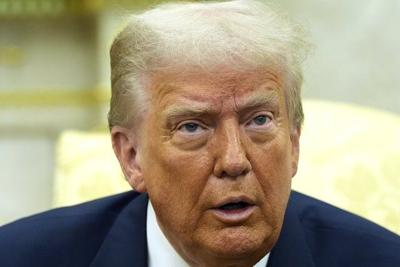WASHINGTON - U.S. President Donald Trump announced more trade deals this week as his deadline for Canada and the United States to negotiate a new economic and security agreement draws closer.
Trump boasted about deals with Japan and the Philippines in posts on social media Wednesday morning, and claimed he will only consider lowering tariff rates if countries open their markets to the United States.
"Another great power of Tariffs. Without them, it would be impossible to get countries to OPEN UP!!! ALWAYS, ZERO TARIFFS TO AMERICA!!!" Trump posted.
While many details of the loose frameworks for the agreements remained unclear after the president's initial announcements on Tuesday, they're already causing concern among North American automakers.
Japan will be hit with 15 per cent tariffs, down from Trump's proposed 25 per cent duties on imports to the United States. While still not clear, it also appears Japanese vehicle imports to the United States will not be subject to the 25 per cent sectoral automobile tariffs, instead facing a lower 15 per cent rate.
Matt Blunt, president of the American Automotive Policy Council, posted on social media that "any deal that charges a lower tariff for Japanese imports with virtually no U.S. content than the tariff imposed on North American-built vehicles with high U.S. content is a bad deal for U.S. industry and U.S. auto workers."
The council represents the Big Three automakers — General Motors, Ford and Stellantis — which are being bludgeoned by 50 per cent tariffs on steel and aluminum.
The North American automobile industry is deeply integrated and vehicles imported into the United States that comply with the Canada-U.S.-Mexico Agreement on trade, called CUSMA, are still being hit with 25 per cent duties on their non-American components.
The deal with Japan could make it cheaper to import Japanese vehicles than to import cars from Canada or Mexico that are half-built from American parts.
General Motors on Tuesday reported a profit decline of 35 per cent in its second quarter, with a $1.1 billion hit from Trump's tariffs. The company said it expects a larger tariff toll in its third quarter.
In addition to the Japan deal, Trump's said the agreement with the Philippines will see that nation hit with 19 per cent levies — slightly lower than the threatened 20 per cent.
In return, the president said both countries would open their markets to American goods. The president also said Japan would invest $550 billion in the U.S. “at my direction."
The White House on Tuesday also provided more information on the framework of the deal with Indonesia that Trump announced earlier this month. That agreement will see Indonesia hit with a 19 per cent tariff, down from Trump's proposed 32 per cent levy.
Trump previously announced frameworks for deals with the United Kingdom and Vietnam.
This week's flurry of announcements comes at an important time for Trump — just over a week before his latest tariff deadline and as pressure mounts on many of America's largest trading partners.
Trump has sent letters to multiple nations, including Canada, saying that if no deal is made by Aug. 1, he will impose high tariffs on imports to the United States.
Trump’s letter to Prime Minister Mark Carney threatened Canada with 35 per cent tariffs but the White House has said the levies will not be applied to imports compliant with the continental trade pact.
On Tuesday, Carney confirmed Canada-U.S. Trade Minister Dominic LeBlanc is in Washington this week but downplayed expectations of a deal by Trump's deadline.
Carney said the government will agree to a deal "if there's one on the table that is in the best interests of Canadians."
At the close of the Council of the Federation gathering in Huntsville, Ont., on Wednesday, Ontario Premier Doug Ford compared Canada's trading relationship with the United States to that of Japan, saying Canada imports 400 per cent more American products than the Japanese.
Ford said Canada is an "economic powerhouse" and it doesn't have "to take a back seat to anyone."
"We sure the heck don't have to take a back seat to Donald Trump," he said. "We need to start diversifying our trade, sending our goods around the world."
Other countries are watching closely for details of the deals. It remains unclear whether striking an agreement with the U.S. now would mean a reprieve from Trump's separate import taxes on steel, aluminum and automobiles, which operate outside his global tariff regime. Duties on copper are also set to be introduced on Aug. 1.
Trump has launched multiple trade investigations under Section 232 of the Trade Expansion Act of 1962 into other key sectors — investigations that may lead to tariffs on things like semiconductors and lumber at some point in the future.
— With files from The Associated Press
This report by The Canadian Press was first published July 23, 2025.

